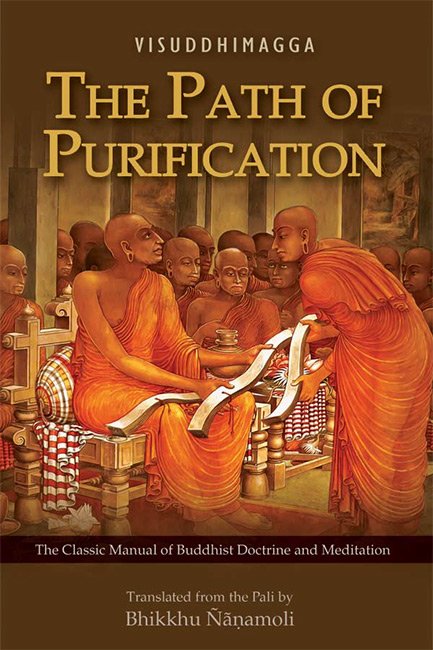Visuddhimagga (the pah of purification)
by Ñāṇamoli Bhikkhu | 1956 | 388,207 words | ISBN-10: 9552400236 | ISBN-13: 9789552400236
This page describes Guarding the Sign of the section The Earth Kasiṇa (Pathavī-kasiṇa-niddesa) of Part 2 Concentration (Samādhi) of the English translation of the Visuddhimagga (‘the path of purification’) which represents a detailled Buddhist meditation manual, covering all the essential teachings of Buddha as taught in the Pali Tipitaka. It was compiled Buddhaghosa around the 5th Century.
Guarding the Sign
34. The arousing of the counterpart sign, which arises together with access concentration, is very difficult. Therefore if he is able to arrive at absorption in that same session by extending the sign, it is good. If not, then he must guard the sign diligently as if it were the foetus of a Wheel-turning Monarch (World-ruler).
So guard the sign, nor count the cost,
And what is gained will not be lost;
Who fails to have this guard maintained
Will lose each time what he has gained. [127]
35. Herein, the way of guarding it is this:
(1) Abode, (2) resort, (3) and speech, (4) and person,
(5) The food, (6) the climate, (7) and the posture—
Eschew these seven different kindsWhenever found unsuitable.
But cultivate the suitable;
For one perchance so doing finds
He need not wait too long until
Absorption shall his wish fulfil.
36. 1. Herein, an abode is unsuitable if, while he lives in it, the unarisen sign does not arise in him or is lost when it arises, and where unestablished mindfulness fails to become established and the unconcentrated mind fails to become concentrated. That is suitable in which the sign arises and becomes confirmed, in which mindfulness becomes established and the mind becomes concentrated, as in the Elder Padhāniya-Tissa, resident at Nāgapabbata. So if a monastery has many abodes he can try them one by one, living in each for three days, and stay on where his mind becomes unified. For it was due to suitability of abode that five hundred bhikkhus reached Arahantship while still dwelling in the Lesser Nāga Cave (Cūḷa-nāga-leṇa) in Tambapaṇṇi Island (Sri Lanka) after apprehending their meditation subject there. There is no counting the streamenterers who have reached Arahantship there after reaching the noble plane elsewhere; so too in the monastery of Cittalapabbata, and others.
37. 2. An alms-resort village lying to the north or south of the lodging, not too far, within one kosa and a half, and where alms food is easily obtained, is suitable. The opposite kind is unsuitable.[1]
38. 3. Speech: that included in the thirty-two kinds of aimless talk is unsuitable; for it leads to the disappearance of the sign. But talk based on the ten examples of talk is suitable, though even that should be discussed with moderation.[2]
39. 4. Person: one not given to aimless talk, who has the special qualities of virtue, etc., by acquaintanceship with whom the unconcentrated mind becomes concentrated, or the concentrated mind becomes more so, is suitable. One who is much concerned with his body,[3] who is addicted to aimless talk, is unsuitable; for he only creates disturbances, like muddy water added to clear water. And it was owing to one such as this that the attainments of the young bhikkhu who lived at Koṭapabbata vanished, not to mention the sign. [128]
40. 5. Food: Sweet food suits one, sour food another.
6. Climate: a cool climate suits one, a warm one another. So when he finds that by using certain food or by living in a certain climate he is comfortable, or his unconcentrated mind becomes concentrated, or his concentrated mind becomes more so, then that food or that climate is suitable. Any other food or climate is unsuitable.
41. 7. Postures: walking suits one; standing or sitting or lying down suits another. So he should try them, like the abode, for three days each, and that posture is suitable in which his unconcentrated mind becomes concentrated or his concentrated mind becomes more so. Any other should be understood as unsuitable.
So he should avoid the seven unsuitable kinds and cultivate the suitable. For when he practices in this way, assiduously cultivating the sign, then, “he need not wait too long until absorption shall his wish fulfil.”
Footnotes and references:
[1]:
North or south to avoid facing the rising sun in coming or going. Kosa is not in PED; “one and a half kosa = 3,000 bows” (Vism-mhṭ 123).
[2]:
Twenty-six kinds of “aimless” (lit. “animal”) talk are given in the Suttas (e.g. M II 1; III 113), which the commentary increases to thirty-two (M-a III 233). The ten instances of talk are those given in the Suttas (e.g. M I 145;III 113). See Ch. I, n.12.
[3]:
“One who is occupied with exercising and caring for the body” (Vism-mhṭ 124).
